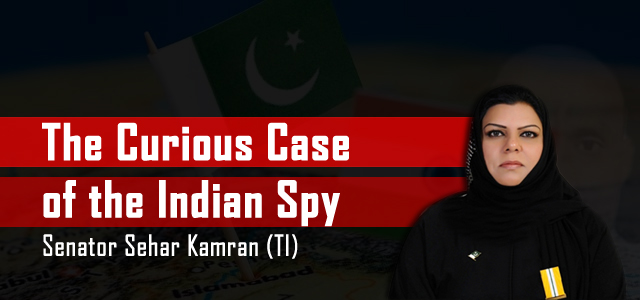By Senator Sehar Kamran (TI)
April 10, 2016

“All Members shall refrain in their international relations from the threat or use of force against the territorial integrity or political independence of any State, or in any other manner inconsistent with the Purposes of the United Nations.”–Article 2(4), United Nations Charter.
On 27th March 2016, a man was arrested from the Saravan border crossing over into Pakistani Balochistan. He is charged with espionage, subversion, as well as other acts to directly instigate terrorism and destabilise Pakistan. This man has been identified as an Indian Naval Officer, who went by the name of ‘Hussain Mubarak Patel’ in Pakistan, and Kulbashan Yadav in his native India.
The officer has confessed, both to his identity and to the nature of his operation; the former has been verified by his family. Yadav had been living in and operating from the area for about 14 years. Reports indicate that his capture was the result of the complacency that stemmed from the length of his presence in the country. His arrest, given his self-professed status as a serving commander, makes him the senior most person to have been arrested on espionage charges in Pakistan.
The arrest has not only raised many more linked questions, but also validated Pakistan’s long-standing claims of active and belligerent Indian involvement inside Pakistani territory. Once again Pakistan has found itself in a position where its territorial integrity and sovereignty has been violated. And once again, despite a clear breach of the UN charter, its concerns are being met with international silence.
While spy-craft is an institution as old as the advent of civil society itself, it is generally accepted as being at the root of many an international conflict, and as such has been criminalised in any way, shape or form within international law and its custodian, the UN. And it is in the recognition and upholding of the UN Charter that the international system as we know it has been able to exist and ward off the insecurity and anarchy this creates. Today, when the entire world is on fire, it is more important than ever to remember how the UN was established after the Second World War to maintain international peace and security. And the norm of respecting territorial integrity and sovereignty of other states is enshrined in this very Charter. Any breaches or state-sponsored activity against any other state is taken as violation of international law.
It is equally important to consider how the failure of this system through such violations can very easily result in a return to the anarchical insecurity that has proven so very destructive in the past.
Silence at the capture of a spy from a signatory state of the UN, who has confessed to carrying out activities to undermine the Pakistani state, is not a new trend by any means. It highlights the attitude of indifference, discount and disregard by world bodies and the international community towards Pakistan’s legitimate security concerns.
Whether it is in the form of open threats made to the territorial integrity and sovereignty of Pakistan by the present Indian National Security Officer, Ajit Doval – who is often also termed by the Indian media as the ‘Great Indian Spy’ as he lived and operated from within Pakistan for over seven years – by “advocating the policy of supporting militant groups to neutralise ‘terror threats’ emanating from Pakistan”. Or the Indian Premiere Narendra Modi’s remarks in Bangladesh, in which he clearly and openly admitted to the Indian role in ‘subversive activities to destabilise Pakistan’ and at Dhaka University on June 6, 2015 while discussing the events of 1971 which eventually led to the disintegration of Pakistan. Indian policy with regard to Pakistan remains very clear, and belligerent at best. This case of the Indian Naval Officer is proving to be no different, nor is it inconsistent with the current Indian regime’s public statements and greater policy declarations.
And despite the fact that in October 2015, the government of Pakistan shared three dossiers with the UN, containing evidences pertaining to Indian interference in Balochistan, Federally Administered Tribal Areas (Fata) and Karachi, no follow-ups or reprimands were considered necessary. Today, these charges of interference are supported by the physical reality of Indian espionage on Pakistani soil in an undeniable manner.
It needs to be understood the global discriminatory narrative or practice of belittling genuine and now proven concerns of Pakistan emanating from its neighbour’s heinous intentions will only lead to further regional instability and the disruption of global peace. Pakistan’s voice in the international realm needs to be acknowledged, not only to assuage the state’s concerns, but also to preserve the structure of and faith in the international community. Today, this incident will not only harm or destabilise Pakistan, but holds the potential to bring about the collapse of the current international order, as all states that lose faith in the system will want to revert to any measures that will safeguard their national interests, ‘by hook or by crook’. The continuing lack of international interest in the concerns of smaller states can have serious repercussions for global security, stability and peace.
The State of Pakistan must raise the issue of Indian espionage and sabotage activities inside Pakistan’s territory within the global community in this context of international law. As Article 29 of the Hague Regulations 1907 identifies: “A person can only be considered a spy when, acting clandestinely or on false pretences, he obtains or endeavours to obtain information in the zone of operations of a belligerent, with the intention of communicating it to the hostile party.” Through his own confession, this person satisfies this criteria. And since the purpose of spy-craft essentially remains the same: “to gather intelligence and create instances which cause instability and complications where territorial integrity and sovereignty of the state they are operating in”, the challenge posed by these activities must be acknowledged and appropriately admonished.
It is high time that the international community stops taking the certainty of the current status quo for granted. And it is high time the Pakistani state fights a stronger battle for safeguarding its interests within the international legal framework, without de-emphasising the importance of not forcing the state to lose its faith in this system. In the words of the late Martin Luther King Jr, “Injustice anywhere is a threat to justice everywhere.”
Same version of the article appeared in The Nation


